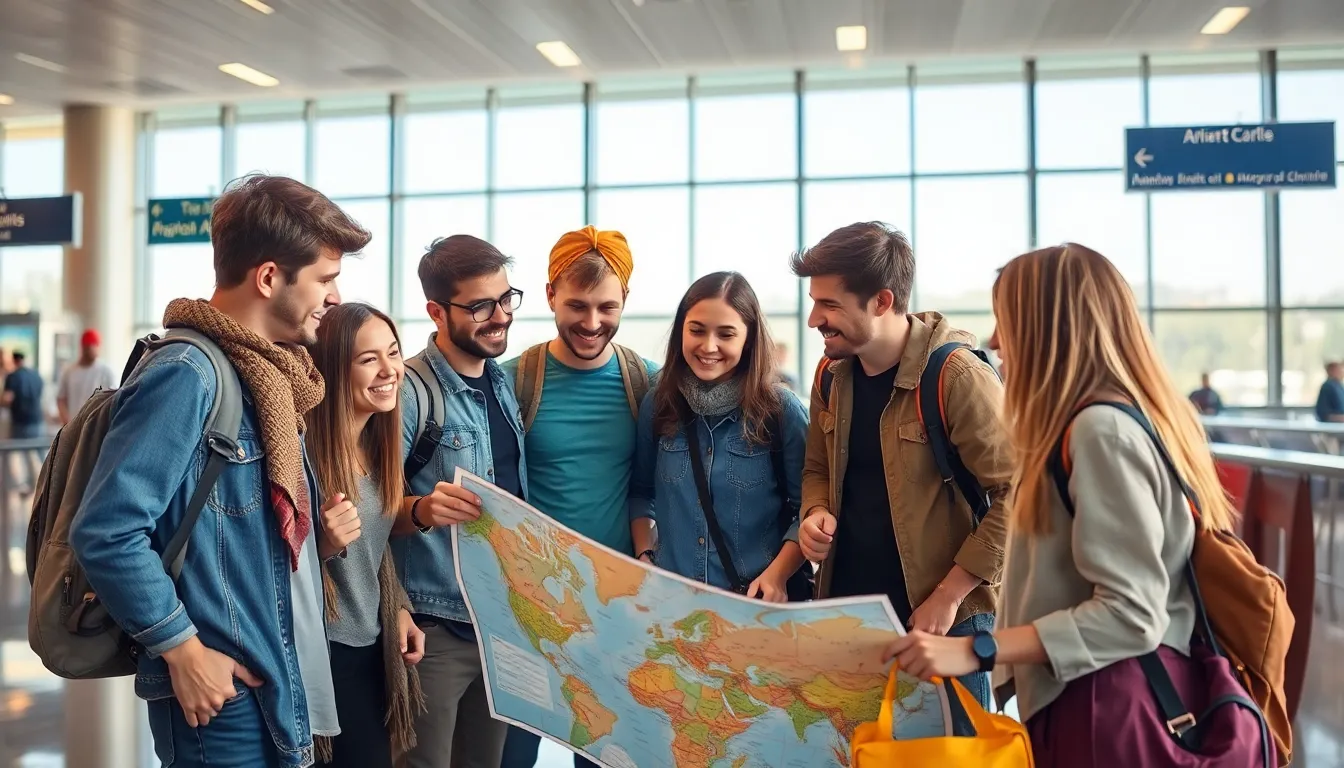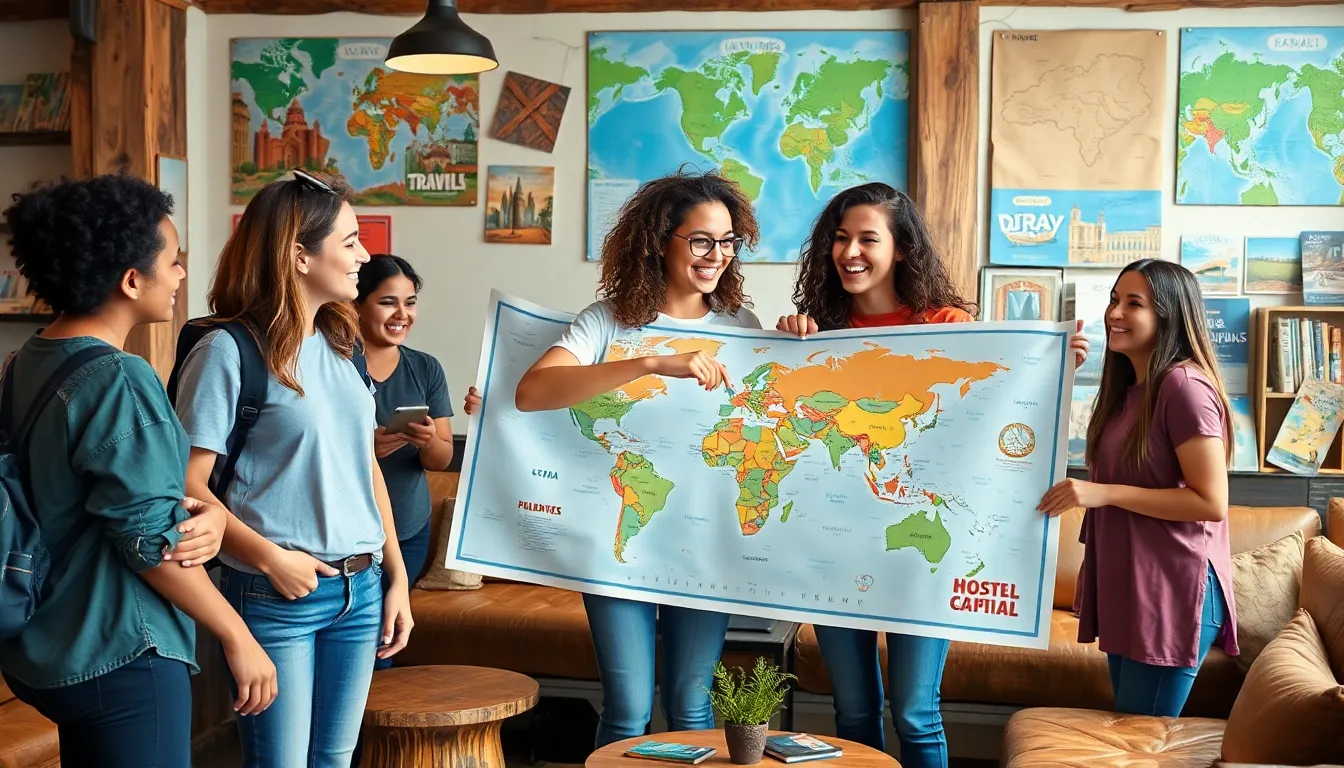Traveling as a student can feel like a rite of passage, but let’s face it—balancing a budget while trying to explore the world isn’t exactly a walk in the park. Between ramen noodle dinners and last-minute cramming for exams, finding the perfect travel tips can make or break a trip. Who wouldn’t want to swap a cramped dorm room for a sun-soaked beach or a bustling city street?
Table of Contents
ToggleEssential Student Travel Tips
Planning helps students maximize their travel experience. Consider establishing a budget before booking any trips. Use funds wisely to avoid overspending on unnecessary items.
Find accommodations that fit a student’s budget. Hostels and shared rentals provide cost-effective solutions while fostering connections with fellow travelers. Students often discover social opportunities in these settings.
Research destinations ahead of time. Knowledge about local customs, transportation options, and attractions enhances the travel experience. Embrace studying public transport networks to save money on taxis.
Pack efficiently with essentials in mind. Bring versatile clothing suitable for various situations. Include a reusable water bottle to stay hydrated and cut costs on drinks.
Leverage student discounts during travel. Many museums, transportation services, and restaurants offer reduced rates with a student ID. Investigating these options can create significant savings.
Stay connected with friends and family. Use mobile apps that allow communication over Wi-Fi, reducing international call charges. Secure a portable charger for devices to ensure connectivity while on the go.
Be flexible with travel dates. Off-peak travel often yields lower prices and less crowded attractions. Planning trips during school breaks can maximize enjoyment without added expense.
Engage with local cultures. Participate in free or low-cost activities, such as community tours or festivals, to gain authentic experiences. Dining at local markets provides both budget-friendly options and unique culinary experiences.
Adopting these essential travel tips empowers students to explore the world while maintaining financial responsibility.
Planning Your Trip

Planning a trip involves careful consideration and strategic choices. Students can enhance their travel experiences by organizing details in advance.
Budgeting for Travel
Creating a budget remains a cornerstone of any travel plan. Establishing a specific spending limit helps students avoid financial pitfalls. Assessing potential expenses, like transportation, accommodations, and meals, provides clarity. Using budgeting apps can track spending and reveal areas for savings. Identifying discounts tailored for students from travel agencies or websites allows for extra financial flexibility. Allocating funds for emergencies ensures a safety net while traveling. Planning trips during off-peak seasons generally results in lower prices.
Choosing Destinations
Selecting the right destination requires research and exploration. Prioritizing locations known for budget-friendly options enhances travel feasibility. Considering accessibility via affordable transportation makes a difference. Students can benefit from exploring regional attractions or popular sites in neighboring countries. Investigating local customs, activities, and accommodations develops a well-rounded itinerary. Students often find joy in immersing themselves in local cultures rather than the usual tourist spots. Seeking advice from fellow travelers or online communities can unveil hidden gems.
Packing Wisely
Packing wisely ensures a smooth travel experience for students. Focus on essentials and prioritize flexibility.
Must-Have Items for Students
Packing light is crucial. Include a versatile wardrobe with mix-and-match clothing items. A sturdy backpack serves well for daily excursions. Toiletries should be travel-sized for easy carry. Don’t forget a reusable water bottle and snacks for long journeys. Electronics like a charger and portable battery prevent disruptions. First-aid supplies and essential medicines ensure preparedness. Useful documents like student ID and travel insurance details should remain accessible.
Tips for Carrying Luggage
Selecting the right luggage makes travel easier. Use a lightweight suitcase or backpack for convenience. Organize belongings with packing cubes for quick access. Carry a small daypack for essentials during outings. Avoid overpacking to maintain mobility. Utilize luggage locks for security when in transit. Always check weight limits with airlines to avoid fees. Consider bringing a foldable bag for souvenirs on the return trip.
Navigating Transportation
Effective transportation strategies can significantly enhance the travel experience for students. Smart choices in this area often save both time and money.
Public Transport Tips
Using public transport can be both economical and efficient. Students should research local transit systems, as many cities offer discount passes for students. Familiarity with routes and schedules leads to smoother travel experiences. Prioritizing safety is crucial, especially when navigating unfamiliar areas. Carrying a smartphone with maps or apps can simplify finding the right connections. Utilizing subway systems or buses during off-peak hours can also reduce travel time and overcrowding.
Car Rental Advice
Renting a car provides flexibility for exploring off-the-beaten-path locations. Students should compare rental companies to find the best deals, focusing on student discounts. Understanding age restrictions is key, as many rental agencies set minimum age limits or charge extra fees for younger drivers. Inspecting the vehicle for damage before leaving the lot is necessary to avoid unexpected charges. Planning routes in advance can enhance efficiency and ease of travel. Choosing insurance options is essential to ensure peace of mind during the journey.
Staying Safe While Traveling
Traveling requires attention to safety. Students should keep personal items secure, using crossbody bags or money belts that remain hidden under clothing.
Familiarity with local laws and customs offers essential protection. Respecting cultural norms helps avoid misunderstandings.
Awareness of surroundings is crucial. Scanning for potential risks, such as unfamiliar faces or questionable areas, supports better judgment.
In case of emergencies, students must carry a list of local emergency contacts. Including the nearest embassy or consulate in the list ensures assistance is readily available.
Setting up mobile alerts enhances safety during travel. Using apps for real-time safety updates provides added peace of mind.
Traveling in groups often promotes security. Friends can watch out for each other, reducing individual vulnerabilities.
Keeping emergency numbers easily accessible saves valuable time. Writing them down and storing them in wallets or phones makes them immediate.
Staying connected through mobile devices helps maintain contact with friends and family. Sharing itineraries guarantees that someone knows your whereabouts.
When out, trust instincts. If a situation feels uncomfortable, leaving is the best option for safety.
Using reputable transportation services minimizes risks. Choosing licensed taxis or rideshare options contributes to safer travel experiences.
Monitoring personal belongings in crowded places prevents theft. Staying vigilant in busy areas where distractions may occur is vital.
Planning safe routes and avoiding isolated or poorly lit areas reduces hazards while exploring. Traveling smart enhances overall enjoyment and well-being during any adventure.
Traveling as a student can be an enriching experience filled with adventure and personal growth. By following practical tips and strategies, students can explore new destinations without breaking the bank. Careful planning and budgeting are key to making the most of their journeys while ensuring financial stability.
Embracing local cultures and seeking affordable activities enhances the travel experience. With the right mindset and resources, students can create unforgettable memories that extend beyond their academic pursuits. Ultimately, a well-prepared traveler is a confident traveler, ready to embrace the world.





